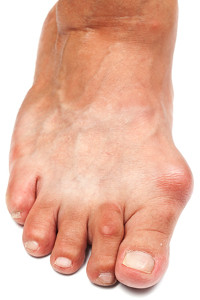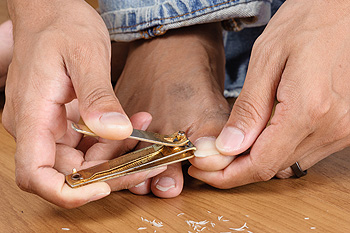Blog
Are You Suffering From Ingrown Toenails?
Are Bunions Painful?
If you have a bony protrusion at the base of the big toe, you most likely have a bunion. It is considered to be a deformity of the joint in that area of the toe. The symptoms that many patients notice often include skin that is sensitive on top of the bunion, and changes to the shape of the foot. Additionally, pain, swelling, and callused skin can accompany this condition. Research has indicated bunions may be caused by genetic factors and wearing shoes that do not fit correctly can make bunions worse. Mild relief may be found if bunion pads or orthotics are worn. If this is ineffective, surgery may be necessary if permanent removal of the bunion is desired. If you have developed a bunion, it is advised to seek the counsel of a podiatrist who can guide you toward the treatment that is right for you.
If you are suffering from bunion pain, contact Dr. Tupper of Coshocton Foot Health Center. Our doctor can provide the care you need to keep you pain-free and on your feet.
What Is a Bunion?
Bunions are painful bony bumps that usually develop on the inside of the foot at the joint of the big toe. As the deformity increases over time, it may become painful to walk and wear shoes. Women are more likely to exacerbate existing bunions since they often wear tight, narrow shoes that shift their toes together. Bunion pain can be relieved by wearing wider shoes with enough room for the toes.
Causes
- Genetics – some people inherit feet that are more prone to bunion development
- Inflammatory Conditions - rheumatoid arthritis and polio may cause bunion development
Symptoms
- Redness and inflammation
- Pain and tenderness
- Callus or corns on the bump
- Restricted motion in the big toe
In order to diagnose your bunion, your podiatrist may ask about your medical history, symptoms, and general health. Your doctor might also order an x-ray to take a closer look at your feet. Nonsurgical treatment options include orthotics, padding, icing, changes in footwear, and medication. If nonsurgical treatments don’t alleviate your bunion pain, surgery may be necessary.
If you have any questions, please feel free to contact our office located in Coshocton, OH . We offer the newest diagnostic and treatment technologies for all your foot care needs.
How Do Broken Toes Heal?
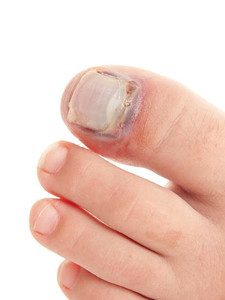 The bones in the toes are delicate and small and can easily break if a heavy object drops on one of them. Some of the symptoms that are associated with broken toes include bruising that may last for one to two weeks, severe pain, stiffness, and swelling. Many broken toes can be treated without surgery, unless the fracture is severe. This includes breaks, which result in the toe becoming crooked, or causes an open wound. The healing process begins with resting and elevating the foot, and this is helpful in reducing any existing swelling. Many patients find it beneficial to tape the affected toe to the toe next to it, and this is referred to as buddy taping. If you have endured an injury to your toe, it is suggested that you consult with a podiatrist who can offer proper treatment options.
The bones in the toes are delicate and small and can easily break if a heavy object drops on one of them. Some of the symptoms that are associated with broken toes include bruising that may last for one to two weeks, severe pain, stiffness, and swelling. Many broken toes can be treated without surgery, unless the fracture is severe. This includes breaks, which result in the toe becoming crooked, or causes an open wound. The healing process begins with resting and elevating the foot, and this is helpful in reducing any existing swelling. Many patients find it beneficial to tape the affected toe to the toe next to it, and this is referred to as buddy taping. If you have endured an injury to your toe, it is suggested that you consult with a podiatrist who can offer proper treatment options.
A broken toe can be very painful and lead to complications if not properly fixed. If you have any concerns about your feet, contact Dr. Tupper from Coshocton Foot Health Center. Our doctor will treat your foot and ankle needs.
What to Know About a Broken Toe
Although most people try to avoid foot trauma such as banging, stubbing, or dropping heavy objects on their feet, the unfortunate fact is that it is a common occurrence. Given the fact that toes are positioned in front of the feet, they typically sustain the brunt of such trauma. When trauma occurs to a toe, the result can be a painful break (fracture).
Symptoms of a Broken Toe
- Throbbing pain
- Swelling
- Bruising on the skin and toenail
- The inability to move the toe
- Toe appears crooked or disfigured
- Tingling or numbness in the toe
Generally, it is best to stay off of the injured toe with the affected foot elevated.
Severe toe fractures may be treated with a splint, cast, and in some cases, minor surgery. Due to its position and the pressure it endures with daily activity, future complications can occur if the big toe is not properly treated.
If you have any questions please feel free to contact our office located in Coshocton, OH . We offer the newest diagnostic and treatment technologies for all your foot and ankle needs.
Toenail Fungus Is Contagious
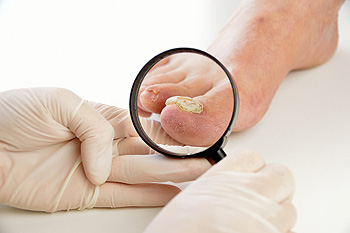 The condition that is known as toenail fungus is considered to be contagious. The fungus that causes this nail infection typically thrives in warm and moist environments. These places may include public pools, shower room floors, locker rooms, and surrounding areas. When appropriate footwear is worn, the chances of getting toenail fungus may be reduced. The infection may also develop if patients have wet nails for extended periods of time, sometimes due to wearing sweaty shoes for consecutive days. Symptoms of toenail fungus may include the nail becoming thick, in addition to the nail turning a yellow, green, or brown color. Research has indicated that when early treatment is implemented, damage to the nail may be minimized. If you feel you have developed toenail fungus, it is important that you consult with a podiatrist who can advise you on proper treatment options.
The condition that is known as toenail fungus is considered to be contagious. The fungus that causes this nail infection typically thrives in warm and moist environments. These places may include public pools, shower room floors, locker rooms, and surrounding areas. When appropriate footwear is worn, the chances of getting toenail fungus may be reduced. The infection may also develop if patients have wet nails for extended periods of time, sometimes due to wearing sweaty shoes for consecutive days. Symptoms of toenail fungus may include the nail becoming thick, in addition to the nail turning a yellow, green, or brown color. Research has indicated that when early treatment is implemented, damage to the nail may be minimized. If you feel you have developed toenail fungus, it is important that you consult with a podiatrist who can advise you on proper treatment options.
For more information about treatment, contact Dr. Tupper of Coshocton Foot Health Center. Our doctor can provide the care you need to keep you pain-free and on your feet.
Toenail Fungus Treatment
Toenail fungus is a condition that affects many people and can be especially hard to get rid of. Fortunately, there are several methods to go about treating and avoiding it.
Antifungals & Deterrence
Oral antifungal medicine has been shown to be effective in many cases. It is important to consult with a podiatrist to determine the proper regiment for you, or potentially explore other options.
Applying foot powder on the feet and shoes helps keep the feet free of moisture and sweat.
Sandals or open toed shoes – Wearing these will allow air movement and help keep feet dry. They also expose your feet to light, which fungus cannot tolerate. Socks with moisture wicking material also help as well.
If you have any questions please feel free to contact our office located in Coshocton, OH . We offer the newest diagnostic tools and technology to treat your foot and ankle needs.
Overall Health May Improve When the Feet Are Properly Cared For
It is known that the feet are the foundation of the body. Many people tend to ignore their feet until some type of pain is felt. Research has indicated that when frequent foot care is practiced, the feet and overall health of the body may be positively affected. This type of care may include washing and drying the feet daily, which may help to prevent unpleasant foot odor, or athlete’s foot. The feet will feel good after a moisturizer is applied, and this may prevent cracked heels from developing. Additionally, it is helpful to wear shoes that have adequate room for the toes to move freely in. Flip flops do not provide stability and proper arch support for the foot, and it is suggested to limit wearing these types of shoes. If you would like additional information about how to care for your feet daily, it is suggested that you consult with a podiatrist.
Everyday foot care is very important to prevent infection and other foot ailments. If you need your feet checked, contact Dr. Tupper from Coshocton Foot Health Center. Our doctor can provide the care you need to keep you pain-free and on your feet.
Everyday Foot Care
Often, people take care of their bodies, face and hair more so than they do for their feet. But the feet are a very important aspect of our bodies, and one that we should pay more attention to. Without our feet, we would not be able to perform most daily tasks.
It is best to check your feet regularly to make sure there are no new bruises or cuts that you may not have noticed before. For dry feet, moisturizer can easily be a remedy and can be applied as often as necessary to the affected areas. Wearing shoes that fit well can also help you maintain good foot health, as well as making it easier to walk and do daily activities without the stress or pain of ill-fitting shoes, high heels, or even flip flops. Wearing clean socks with closed shoes is important to ensure that sweat and bacteria do not accumulate within the shoe. Clean socks help to prevent Athlete’s foot, fungi problems, bad odors, and can absorb sweat.
If you have any questions please feel free to contact our office located in Coshocton, OH . We offer the newest diagnostic and treatment technologies for all your foot and ankle needs.
Before you start dancing...
Foot Conditions That Elderly People May Have
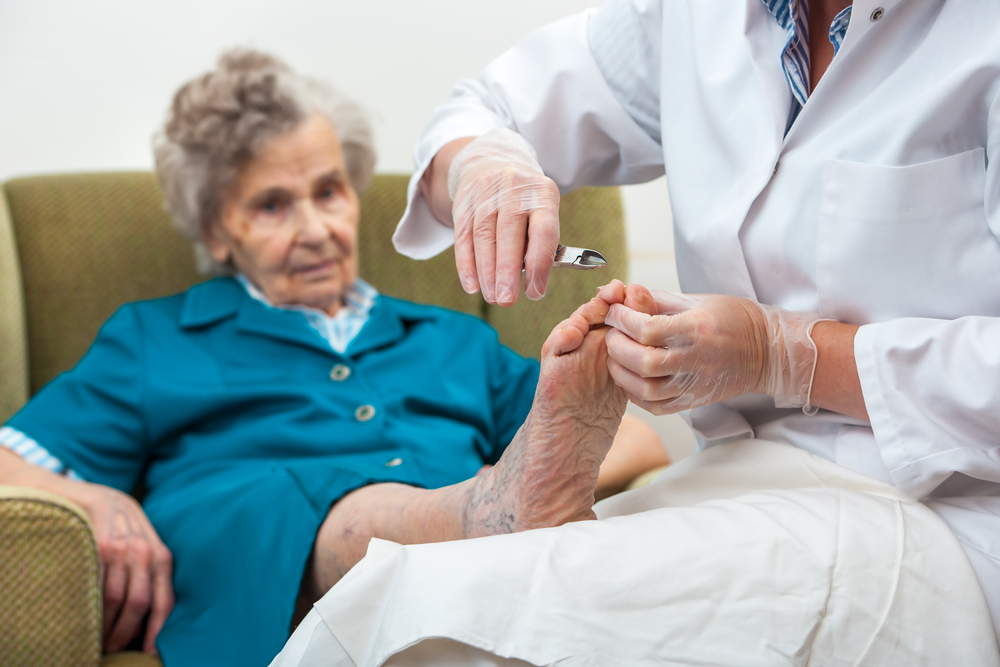 Many elderly people may experience foot problems as a result of a loss of cushioning in the feet and poor circulation. An effective way to protect the feet may be to wear shoes that fit correctly. Additionally, if standing is done for the majority of the day, the feet may feel better if gentle stretches are performed. Many patients develop athlete’s foot, which is a common fungus that attacks the bottom of the feet and between the toes. This may be prevented if the feet are washed and dried thoroughly each day, followed by wearing clean socks and shoes. It is common for seniors to have dry skin, and a symptom of this may be an itchy or burning sensation. Prevention of this may include using a moisturizer on the feet after a shower or bath is taken. If you would like additional information about how to properly care for elderly feet, please feel free to speak to a podiatrist.
Many elderly people may experience foot problems as a result of a loss of cushioning in the feet and poor circulation. An effective way to protect the feet may be to wear shoes that fit correctly. Additionally, if standing is done for the majority of the day, the feet may feel better if gentle stretches are performed. Many patients develop athlete’s foot, which is a common fungus that attacks the bottom of the feet and between the toes. This may be prevented if the feet are washed and dried thoroughly each day, followed by wearing clean socks and shoes. It is common for seniors to have dry skin, and a symptom of this may be an itchy or burning sensation. Prevention of this may include using a moisturizer on the feet after a shower or bath is taken. If you would like additional information about how to properly care for elderly feet, please feel free to speak to a podiatrist.
If you need your feet checked, contact Dr. Tupper of Coshocton Foot Health Center. Our doctor will attend to all of your foot and ankle needs and provide you with quality treatment.
Geriatrics and Podiatry
When people age, some common issues that may occur are bone density loss, dry skin, poor circulation, and rough brittle nails. These issues may also affect your foot health if the necessary steps are not taken to alleviate the problems.
It is important to take care of your feet because feet that are injured or diseased can affect your overall health. Having painful feet hinders your ability to do daily activities or may decrease your willingness to do the things that you need to do.
Visiting Your Geriatrician
As we age, health problems become more likely, so it is essential to visit your doctor for check-ups to ensure that you are doing the best you can to take care of your health. It is recommended to check your feet frequently for any possible cuts, bruises, swelling, corns or any other irregularities.
Taking Care of Elderly Feet
Cracked or dry feet can be treated by applying moisturizer often. It is also important not to wear old socks because the older the sock is, the higher the possibility there will be that there is bacteria there. Wear fresh socks and make sure they fit properly.
Proper foot health means that you can have a more active lifestyle and you will not be bogged down by pain. Foot health also leads to good circulation, which is paramount for overall health.
If you have any questions, please feel free to contact our office located in Coshocton, OH . We offer the newest diagnostic tools and technology to treat your foot and ankle needs.
Understanding Your Foot Pain
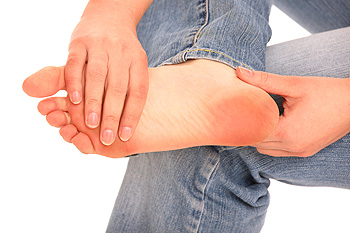 Foot pain is a broad term that covers many different types of pain. The foot is a complex part of the body that is comprised of many bones, ligaments and muscles; therefore, pain can be felt in various parts of the feet. The degree of pain or discomfort felt can highly differ. Pain can present itself as throbbing, aching, stabbing, or mild tenderness. Understanding and learning about your foot pain is key in figuring out what the underlying issue is. Some of the most common foot conditions that cause pain are plantar fasciitis, tarsal tunnel syndrome, metatarsalgia, Morton's neuroma, and Achilles tendinitis. All of these conditions cause pain in different locations and result in different types of pain. If you are experiencing any foot pain, speak with a podiatrist who can properly diagnose and treat the ailment.
Foot pain is a broad term that covers many different types of pain. The foot is a complex part of the body that is comprised of many bones, ligaments and muscles; therefore, pain can be felt in various parts of the feet. The degree of pain or discomfort felt can highly differ. Pain can present itself as throbbing, aching, stabbing, or mild tenderness. Understanding and learning about your foot pain is key in figuring out what the underlying issue is. Some of the most common foot conditions that cause pain are plantar fasciitis, tarsal tunnel syndrome, metatarsalgia, Morton's neuroma, and Achilles tendinitis. All of these conditions cause pain in different locations and result in different types of pain. If you are experiencing any foot pain, speak with a podiatrist who can properly diagnose and treat the ailment.
Foot Pain
Foot pain can be extremely painful and debilitating. If you have a foot pain, consult with Dr. Tupper from Coshocton Foot Health Center. Our doctor will assess your condition and provide you with quality foot and ankle treatment.
Causes
Foot pain is a very broad condition that could be caused by one or more ailments. The most common include:
- Bunions
- Hammertoes
- Plantar Fasciitis
- Bone Spurs
- Corns
- Tarsal Tunnel Syndrome
- Ingrown Toenails
- Arthritis (such as Gout, Rheumatoid, and Osteoarthritis)
- Flat Feet
- Injury (from stress fractures, broken toe, foot, ankle, Achilles tendon ruptures, and sprains)
- And more
Diagnosis
To figure out the cause of foot pain, podiatrists utilize several different methods. This can range from simple visual inspections and sensation tests to X-rays and MRI scans. Prior medical history, family medical history, and any recent physical traumatic events will all be taken into consideration for a proper diagnosis.
Treatment
Treatment depends upon the cause of the foot pain. Whether it is resting, staying off the foot, or having surgery; podiatrists have a number of treatment options available for foot pain.
If you have any questions, please feel free to contact our office located in Coshocton, OH . We offer the newest diagnostic and treatment technologies for all your foot care needs.
What Causes a Blister to Develop?
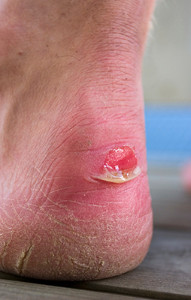 If you frequently run or wear shoes that are too tight, you may develop a blister. This may be a result of excess friction that occurs on a portion of the skin. A blister is defined as a small bubble that is filled with clear liquid and may naturally drain when the affected area of skin has healed. The top layer of the skin may become raw and painful, and the body’s natural defense mechanism may be to develop a blister, which will protect the skin that has been damaged. There may be additional reasons for blisters to develop, which may include allergic reactions, sunburns, or medical conditions such as impetigo. If a blister should become infected, it may appear to be yellow or green, in addition to possibly causing pain and discomfort. If you have a blister on your foot that will not heal, it is suggested that you speak to a podiatrist.
If you frequently run or wear shoes that are too tight, you may develop a blister. This may be a result of excess friction that occurs on a portion of the skin. A blister is defined as a small bubble that is filled with clear liquid and may naturally drain when the affected area of skin has healed. The top layer of the skin may become raw and painful, and the body’s natural defense mechanism may be to develop a blister, which will protect the skin that has been damaged. There may be additional reasons for blisters to develop, which may include allergic reactions, sunburns, or medical conditions such as impetigo. If a blister should become infected, it may appear to be yellow or green, in addition to possibly causing pain and discomfort. If you have a blister on your foot that will not heal, it is suggested that you speak to a podiatrist.
Blisters are prone to making everyday activities extremely uncomfortable. If your feet are hurting, contact Dr. Tupper of Coshocton Foot Health Center. Our doctor can provide the care you need to keep you pain-free and on your feet.
Foot Blisters
Foot blisters develop as a result of constantly wearing tight or ill-fitting footwear. This happens due to the constant rubbing from the shoe, which can often lead to pain.
What Are Foot Blisters?
A foot blister is a small fluid-filled pocket that forms on the upper-most layer of the skin. Blisters are filled with clear fluid and can lead to blood drainage or pus if the area becomes infected.
How Do Blisters Form?
Blisters on the feet are often the result of constant friction of skin and material, usually by shoe rubbing. Walking in sandals, boots, or shoes that don’t fit properly for long periods of time can result in a blister. Having consistent foot moisture and humidity can easily lead to blister formation.
Prevention & Treatment
It is important to properly care for the affected area in order to prevent infection and ease the pain. Do not lance the blister and use a Band-Aid to provide pain relief. Also, be sure to keep your feet dry and wear proper fitting shoes. If you see blood or pus in a blister, seek assistance from a podiatrist.
If you have any questions, please feel free to contact our office located in Coshocton, OH . We offer the newest diagnostic and treatment technologies for all your foot care needs.
Daily Foot Care Is Essential for Diabetic Patients
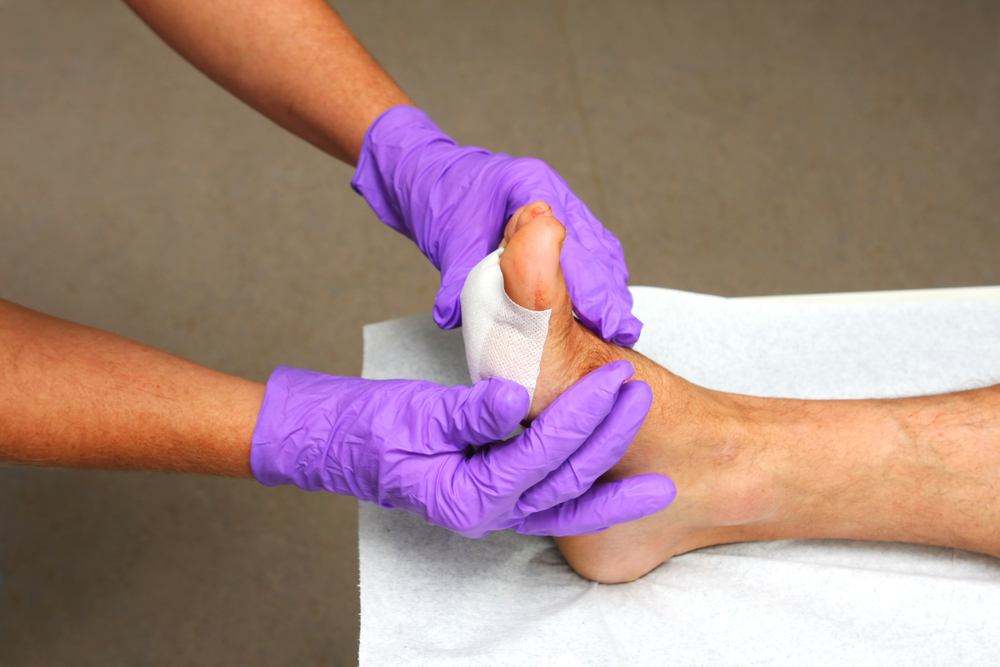 Research has shown the importance of taking care of your feet, and this is especially true if you are a diabetic patient. Many diabetic people have neuropathy, and this may cause a lack of feeling in the feet. Small cuts or bruises may go unnoticed as a result of this condition and may take longer to heal. Foot ulcers may affect up to twenty-five percent of diabetic patients, and it is important to properly take care of your feet. This can be accomplished by checking the feet daily, which may help you to notice any blisters, ingrown toenails, cuts or swelling that may exist. Additionally, the feet should be washed in lukewarm water on a daily basis, gently dried, and followed by using a good moisturizer. This may help to keep the skin soft, which may prevent dry skin. Wearing shoes that fit properly will help the overall health of the feet and choosing seamless socks may aid in preventing cuts in the skin. If you have diabetes, it is strongly suggested that you should seek the counsel of a podiatrist who can properly guide you in learning how to take care of diabetic feet.
Research has shown the importance of taking care of your feet, and this is especially true if you are a diabetic patient. Many diabetic people have neuropathy, and this may cause a lack of feeling in the feet. Small cuts or bruises may go unnoticed as a result of this condition and may take longer to heal. Foot ulcers may affect up to twenty-five percent of diabetic patients, and it is important to properly take care of your feet. This can be accomplished by checking the feet daily, which may help you to notice any blisters, ingrown toenails, cuts or swelling that may exist. Additionally, the feet should be washed in lukewarm water on a daily basis, gently dried, and followed by using a good moisturizer. This may help to keep the skin soft, which may prevent dry skin. Wearing shoes that fit properly will help the overall health of the feet and choosing seamless socks may aid in preventing cuts in the skin. If you have diabetes, it is strongly suggested that you should seek the counsel of a podiatrist who can properly guide you in learning how to take care of diabetic feet.
Diabetic foot care is important in preventing foot ailments such as ulcers. If you are suffering from diabetes or have any other concerns about your feet, contact Dr. Tupper from Coshocton Foot Health Center. Our doctor can provide the care you need to keep you pain-free and on your feet.
Diabetic Foot Care
Diabetes affects millions of people every year. The condition can damage blood vessels in many parts of the body, especially the feet. Because of this, taking care of your feet is essential if you have diabetes, and having a podiatrist help monitor your foot health is highly recommended.
The Importance of Caring for Your Feet
- Routinely inspect your feet for bruises or sores.
- Wear socks that fit your feet comfortably.
- Wear comfortable shoes that provide adequate support.
Patients with diabetes should have their doctor monitor their blood levels, as blood sugar levels play such a huge role in diabetic care. Monitoring these levels on a regular basis is highly advised.
It is always best to inform your healthcare professional of any concerns you may have regarding your feet, especially for diabetic patients. Early treatment and routine foot examinations are keys to maintaining proper health, especially because severe complications can arise if proper treatment is not applied.
If you have any questions please feel free to contact our office located in Coshocton, OH . We offer the newest diagnostic and treatment technologies for all your foot and ankle needs.
More...
Wounds That Don't Heal Need to Be Checked
What Are Heel Spurs?
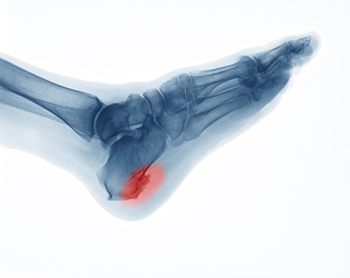 There are many conditions that can cause discomfort in the heel, but one of the most common is heel spurs. A small calcium deposit forms and can eventually extend from your heel bone to your arch. Symptoms associated with heel spurs are pain, inflammation, and swelling at the front of your heel. The heel might also feel warm, and over time, a small protrusion could be visible. Some heel spurs can go unnoticed and only become apparent on an X-ray. Heel spurs develop over time, so they will not suddenly appear. Distinguishing heel spurs from other conditions that cause heel pain can be hard to do on your own, so if you are experiencing heel pain then it is suggested that you speak with a podiatrist who can properly diagnosis you.
There are many conditions that can cause discomfort in the heel, but one of the most common is heel spurs. A small calcium deposit forms and can eventually extend from your heel bone to your arch. Symptoms associated with heel spurs are pain, inflammation, and swelling at the front of your heel. The heel might also feel warm, and over time, a small protrusion could be visible. Some heel spurs can go unnoticed and only become apparent on an X-ray. Heel spurs develop over time, so they will not suddenly appear. Distinguishing heel spurs from other conditions that cause heel pain can be hard to do on your own, so if you are experiencing heel pain then it is suggested that you speak with a podiatrist who can properly diagnosis you.
Heel spurs can be incredibly painful and sometimes may make you unable to participate in physical activities. To get medical care for your heel spurs, contact Dr. Tupper from Coshocton Foot Health Center. Our doctor will do everything possible to treat your condition.
Heels Spurs
Heel spurs are formed by calcium deposits on the back of the foot where the heel is. This can also be caused by small fragments of bone breaking off one section of the foot, attaching onto the back of the foot. Heel spurs can also be bone growth on the back of the foot and may grow in the direction of the arch of the foot.
Older individuals usually suffer from heel spurs and pain sometimes intensifies with age. One of the main condition's spurs are related to is plantar fasciitis.
Pain
The pain associated with spurs is often because of weight placed on the feet. When someone is walking, their entire weight is concentrated on the feet. Bone spurs then have the tendency to affect other bones and tissues around the foot. As the pain continues, the feet will become tender and sensitive over time.
Treatments
There are many ways to treat heel spurs. If one is suffering from heel spurs in conjunction with pain, there are several methods for healing. Medication, surgery, and herbal care are some options.
If you have any questions feel free to contact our office located in Coshocton, OH . We offer the latest in diagnostic and treatment technology to meet your needs.
Reasons for Cracked Heels to Develop
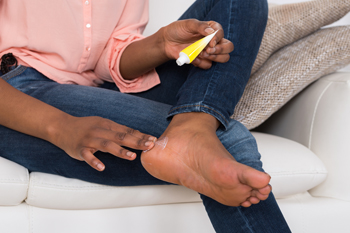 Many people experience cracked heels, and if it begins in childhood, genetic reasons may be the cause. If it starts as an adult, the reasons may be environmental or hormonal. Additionally, medical conditions, which may include eczema and psoriasis, may play a significant role in developing cracked heels. It typically appears as a thickening of the skin on the heel, and deep cracks, or fissures may form if left untreated. Patients who wear open-back sandals or who stand for extended periods of time during the day may find they have cracked heels. Mild relief may be found when washing and drying the feet thoroughly, followed by utilizing a good moisturizer. If you have cracked heels that are painful, it is suggested to speak to a podiatrist who can properly treat this condition.
Many people experience cracked heels, and if it begins in childhood, genetic reasons may be the cause. If it starts as an adult, the reasons may be environmental or hormonal. Additionally, medical conditions, which may include eczema and psoriasis, may play a significant role in developing cracked heels. It typically appears as a thickening of the skin on the heel, and deep cracks, or fissures may form if left untreated. Patients who wear open-back sandals or who stand for extended periods of time during the day may find they have cracked heels. Mild relief may be found when washing and drying the feet thoroughly, followed by utilizing a good moisturizer. If you have cracked heels that are painful, it is suggested to speak to a podiatrist who can properly treat this condition.
Cracked heels are unsightly and can cause further damage to your shoes and feet. If you have any concerns, contact Dr. Tupper from Coshocton Foot Health Center. Our doctor can provide the care you need to keep you pain-free and on your feet.
Cracked Heels
Cracked heels appear unappealing and can make it harder for you walk around in sandals. Aside from looking unpleasant, cracked heels can also tear stockings, socks, and wear out your shoes. There are several methods to help restore a cracked heel and prevent further damage.
How Do You Get Them?
Dry skin is the number one culprit in creating cracked heels. Many athletes, walkers, joggers, and even swimmers suffer from cracked heels. Age and skin oil production play a role to getting cracked heels as well.
Promote Healing
Over the counter medicines can help, especially for those that need instant relief or who suffer from chronic dry feet.
Wear Socks – Wearing socks with medicated creams helps lock in moisture.
Moisturizers – Applying both day and night will help alleviate dryness which causes cracking.
Pumice Stones – These exfoliate and remove dead skin, which allows for smoother moisturizer application and better absorption into the skin.
Change in Diet
Eating healthy with a well-balanced diet will give the skin a fresh and radiant look. Your body responds to the kinds of food you ingest. Omega-3 fatty acids and zinc supplements can also revitalize skin tissue.
Most importantly, seek professional help if unsure how to proceed in treating cracked heels. A podiatrist will help you with any questions or information needed.
If you have any questions, please feel free to contact our office located in Coshocton, OH . We offer the newest diagnostic and treatment technologies for all your foot care needs.
Effective Toe Stretches
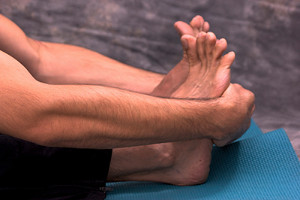 When the feet are properly stretched, running and jumping activities may be easier and safer to perform. Painful injuries may be avoided if correct foot and ankle stretches are frequently practiced, and the overall health of the body may be positively affected. An effective foot stretch that is known as toe curling is effectively done by raising one foot and curling the toes, then repeating on the other foot. Some people find it beneficial to stretch one toe at a time, and this is referred to as toe yoga. Lifting and lowering the heels will help to strengthen the Achilles tendon, in addition to making the joints in the ankle stronger. If you would like more information on how to perform foot stretches, it is suggested to consult with a podiatrist who can properly assist you.
When the feet are properly stretched, running and jumping activities may be easier and safer to perform. Painful injuries may be avoided if correct foot and ankle stretches are frequently practiced, and the overall health of the body may be positively affected. An effective foot stretch that is known as toe curling is effectively done by raising one foot and curling the toes, then repeating on the other foot. Some people find it beneficial to stretch one toe at a time, and this is referred to as toe yoga. Lifting and lowering the heels will help to strengthen the Achilles tendon, in addition to making the joints in the ankle stronger. If you would like more information on how to perform foot stretches, it is suggested to consult with a podiatrist who can properly assist you.
Why Stretching Is Important for Your Feet
Stretching the feet is a great way to prevent injuries. If you have any concerns with your feet consult with Dr. Tupper from Coshocton Foot Health Center. Our doctor will assess your condition and provide you with quality foot and ankle treatment.
Stretching the Feet
Stretching the muscles in the foot is an important part in any physical activity. Feet that are tight can lead to less flexibility and make you more prone to injury. One of the most common forms of foot pain, plantar fasciitis, can be stretched out to help ease the pain. Stretching can not only ease pain from plantar fasciitis but also prevent it as well. However, it is important to see a podiatrist first to determine if stretching is right for you. Podiatrists can also recommend other ways to stretch your feet. Once you know whether stretching is right for you, here are some excellent stretches you can do.
- Using a foam roller or any cylindrical object (a water bottle or soda can will do), roll the object under your foot back and forth. You should also exert pressure on the object. Be sure to do this to both feet for a minute. Do this exercise three times each.
- Similar to the previous exercise, take a ball, such as a tennis ball, and roll it under your foot while seated and exert pressure on it.
- Grab a resistance band or towel and take a seat. If you are using a towel, fold it length wise. Next put either one between the ball of your foot and heel and pull with both hands on each side towards you. Hold this for 15 seconds and then switch feet. Do this three times for each foot.
- Finally hold your big toe while crossing one leg over the other. Pull the toe towards you and hold for 15 seconds. Once again do this three times per foot.
It is best to go easy when first stretching your foot and work your way up. If your foot starts hurting, stop exercising to ice and rest the foot. It is advised that you then see a podiatrist for help.
If you have any questions, please feel free to contact our office located in Coshocton, OH . We offer the newest diagnostic and treatment technologies for all your foot care needs.

